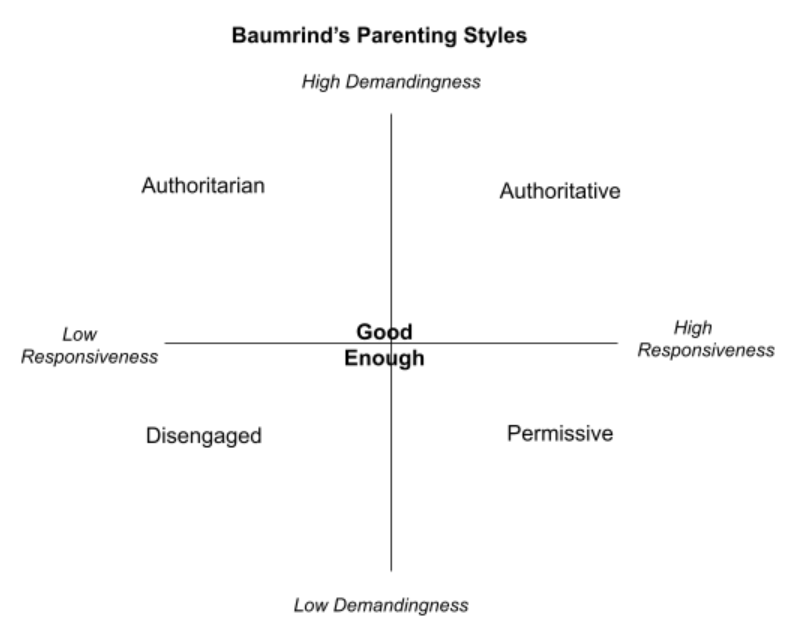The Gold Standard of the Four Parenting Types: Authoritative Parenting
You may have heard of the four parenting types – these were first conceptualized by psychologist Diana Baumrind in the 1960’s and have stood the test of time as meaningful parenting concepts. The parenting types are defined along dimensions of responsiveness and demandingness. Rather than viewing parental authority and warmth as opposing forces, they are considered to be independent dimensions.
The literature on the four parenting styles provides a rich source to guide us as parents. Before I go further, however, I have two important points of caution:
1) Avoid using this information to fuel your own feelings of guilt or wish to be the perfect parent. Most children do just fine when they are raised with “good enough” parenting, which falls middle-of-the-road in the parenting dimensions (see figure). The term “good enough,” as applied to parenting, was coined by the psychoanalyst D.W. Winnicott in the 1950’s, after he observed that babies seemed to thrive even when their mothers responded imperfectly to their distress.
2) Some kids are simply born with challenging temperaments – you could be the most sensitive, skilled parent in the world and still have a child who is struggling. A troubled child does not imply failure on the part of the parents.
Authoritative Style:
· Highly Responsive, where emotional warmth, affection, and attunement are at the forefront. These parents support their child’s independence and allow their child to speak freely and make their own decisions. The high expectations by these parents are tempered by sensitivity to the child and open communication.
· Highly Demanding, with high levels of structure, order, and predictability. Parents have high expectations for maturity and contributions to the family. These parents are not afraid to issue firm sanctions on disruptive behavior. While discipline tends to be power assertive, authoritative parents accompany their discipline with reasons and allow for some negotiation when it comes to household rules.
· Children of authoritative parents tend to be self-reliant, confident, and self-regulated. They tend to have strong achievement motivation and emotional well-being.
Authoritarian Style:
· Low Responsive, where warmth and sensitivity to the child’s needs may be lacking.
· Highly Demanding, where expectations may be similar to those held by authoritative parents. However, authoritarian parents tend to be less predictable in their discipline and might also resort to psychological control tactics such as guilt-tripping (more on this in a future post). Authoritarian parents also tend to be less flexible and less likely to provide a rationale to their children for their parenting decisions.
· Children of authoritarian parents have a higher risk of depression and anxiety, and may also show more problems with disruptive behaviors.
Permissive Style:
· Highly Responsive, with high levels of warmth and acceptance of their children.
· Low Demanding, with lax discipline systems. Permissive parents tend to avoid confrontation with their children and might be anxious about asserting their power as parents.
· Children of permissive parents may be at-risk for problems such as behavior issues, substance abuse, and underachievement.
Disengaged Style:
· If you are reading this post, this style is unlikely to apply to you. Children whose parents are consistently disengaged tend to fare poorly.
Summary
It’s common for parents to span more than one of the parenting styles, and even to flip back and forth between different quadrants. It can be interesting to reflect on what styles were used by your parents, and how this may have impacted your parenting values. For example, perhaps you were raised by authoritarian parents where you felt over-controlled. You might now find yourself dipping into the permissive quadrant out of a desire to avoid squelching your child’s spirit.
This series will continue to explore the topic of limit setting, with effective strategies that will hopefully alleviate worries you may have about leveraging your power as a parent.


